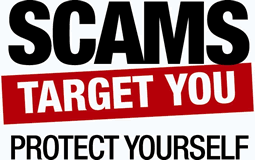 Christmas is around the corner, so does Scams. Each and every year, People become victims to Online scams. Christmas scams is of no exception to the long list.
Christmas is around the corner, so does Scams. Each and every year, People become victims to Online scams. Christmas scams is of no exception to the long list.
So, here we attempt to give you some tips on how to avoid scams this Christmas.
Here we go.
Fake holiday help. Getting a seasonal job can be a great idea. In fact, it is one of our 5 Best Ways to Make More Money. But there are people out there preying on those who need work. Common scams to look out for include all manner of work-from-home jobs. If the so-called employer asks for money up front or your Social Security number, you might be on the verge of becoming a victim rather than an employee.
Fake charities. Don’t ever, ever, ever give money to any charity – even spare change – without checking them out first. And that’s something you can’t do if someone’s on your porch, at an intersection, or on the sidewalk asking for money. Read 4 Tips to Find the Right Charity, then visit the FTC’s website for a charity checklist.
Fake check scams. If someone is giving you money, how can you be scammed? The answer involvesfake checks. In these instances, buyers want what you’re selling on sites like eBay or Craigslist. Their next step is to offer you a cashier’s check for more than your asking price, on the condition that you return the difference. Weeks later, you are informed by your bank that the check was a phony, and you’re now out your money and your goods. The American Bankers Association has some tips to avoid being a victim, but in short, avoid cashier’s checks in situations like this and never return any difference in cash.
Counterfeit merchandise. In New York and other major cities, it is common to see street vendors selling fake watches and purses that appear to be high-end, name-brand goods. The modern version of these scams is to sell the merchandise online where the buyer has even less opportunity to inspect it. As Stacy said, beware of items that are priced well below their competitors, and be sure to buy from an authorized retailer.
Fake vacation rentals. This growing scam involves people who advertise a property they don’t even own! Sometimes the scammer goes to the effort of hijacking the real owner’s email, like in this case recently reported in The Washington Post. Other times, the scammers merely show pictures of a place they pretend to represent. You send them money and show up to find you’ve got no place to stay. Solution? Take every possible step to ensure you’re dealing with the true owner of the property, and always pay by credit card, not wire transfer.
Email scams. Many scams start with email, so be especially skeptical of anything that shows up in your inbox. Some messages involve references to recent events, such as a natural disaster or the death of a public figure. Others purport to award lottery winnings or the transfer of wealth from a foreign country. Don’t ever respond to unsolicited email.
Phishing scams. An email from a legitimate company, like your bank, insists you log in to their website. You’re then directed to a copycat site that steals your username and password. If you ever doubt any email, don’t reply. Instead, call the company or open up a new browser window and go directly to their website. Check out these anti-phishing tips from the Securities and Exchange Commission.
Bottom line? Ninety-nine percent of scams happen when we’re too gullible, too greedy, in too much of a hurry, or when we’re feeling especially charitable. Be generous…but be vigilant.
 Thfire.com Everyday news that matters
Thfire.com Everyday news that matters 